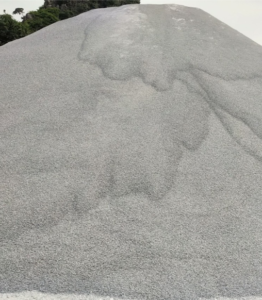Granulated Blast Furnace Slag (GBFS) is a byproduct of the iron and steel industry, formed during the production of pig iron in blast furnaces. When molten slag is rapidly quenched with water, it forms a glassy, granular material known as GBFS, which is later processed for various industrial applications.
Key Properties of GBFS:
- Non-Metallic & Granular: Appears as light-colored, glassy granules with a high silica and alumina content.
- Hydraulic Properties: When finely ground, GBFS can be used as a cementitious material in concrete production.
- Eco-Friendly Material: Utilizes industrial waste, reducing landfill disposal and carbon emissions.
- Enhances Durability: Improves the strength and longevity of concrete structures.
Applications of GBFS:
- Cement Production: Used as a raw material in the production of Portland Slag Cement (PSC).
- Concrete & Mortar Mixes: Enhances workability and durability in construction projects.
- Road Construction: Applied in asphalt and sub-base layers for improved stability.
- Soil Stabilization: Helps reinforce weak soils in geotechnical applications.
- Glass & Ceramics Manufacturing: Utilized in specialized industrial applications.

Advantages of GBFS:
✔ Reduces energy consumption and CO₂ emissions in cement production.
✔ Enhances concrete strength, workability, and resistance to chemicals.
✔ Promotes sustainability by recycling industrial byproducts.
✔ Minimizes heat of hydration, reducing thermal cracking in concrete structures.
GBFS plays a crucial role in sustainable construction and infrastructure development.
